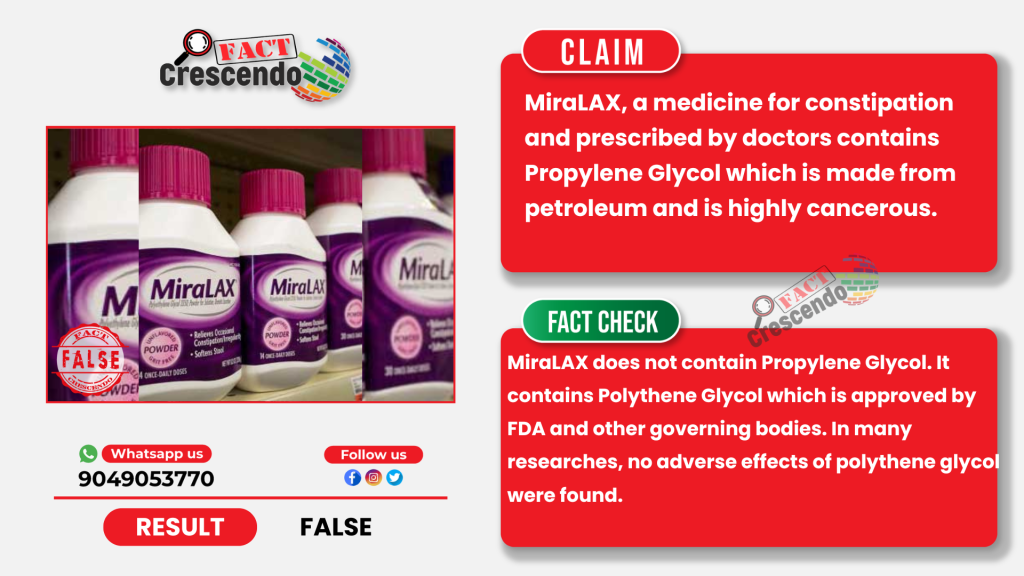
MiraLAX is an over-the-counter laxative commonly used to relieve constipation. It is even prescribed by the doctors. But recently, a social media post claiming that the presence of Propylene Glycol, an ingredient in MiraLAX makes it cancerous.
However, Fact Crescendo found the claim to be false. The main ingredient of MiraLAX is Polythene Glycol and not Propylene Glycol.
What’s the claim?
The claim states that MiraLAX, a medicine for constipation and prescribed by doctors contains Propylene Glycol which is made from petroleum and is highly cancerous. Doctors want to keep us sick to make more money. So, this highly toxic substance should be avoided.
Fact Check-
First, we searched for the ingredients of MiraLAX. As per the information provided on the MiraLAX website, the product contains Polythene Glycol 3550. MiraLAX works naturally with the water in our body to provide effective relief from occasional constipation, without harsh side effects such as gas, bloating, cramping or sudden urgency.
The main ingredient of MiraLAX is Polythene Glycol 3550 and not Propylene Glycol as claimed in the post.
What is Polythene Glycol?
Polyethylene glycol (PEG) is a high molecular weight molecule often combined with electrolytes (like potassium chloride and sodium sulfate) in bowel cleansing solutions. Due to the osmotic nature of these solutions, very little water or electrolytes are absorbed or secreted, though small amounts of PEG and sulfates have been detected in urine, especially in patients with inflammatory bowel disease.
Common side effects include nausea, bloating, and a feeling of fullness in up to half of the users. These solutions are not safe for people with certain conditions, like gastrointestinal blockages or severe bowel diseases.
According to another report, MiraLAX provides relief from occasional constipation and produces a bowel movement. It came with a warning that people allergic to polythene glycol should avoid it and those who have kidney disease or are pregnant must consume it under the supervision of a doctor.
It was instructed that the consumer must contact a doctor if signs of nausea, vomiting or abdominal pain, sudden change in bowel movement that lasts over 2 weeks and irritable bowel syndrome. Apart from this, nowhere it was mentioned that there are chances of developing cancer or any other terminal diseases.
In a research study conducted by FDA, it was found that there is no evidence to support serious side effects of Miralax and similar products with Polythene Glycol (PEG 3350). Most commonly reported side effects include diarrhea, bloating and nausea. No psychiatric/neurological issues are reported in the scientific literature. Similar to many commonly used medications, the use of Miralax (PEG 3350) is approved by FDA for adults only, due to lack of clinical trials in children. Its metabolism and long-term use in children are being studied.
PEG 3550 has also been approved by the FDA. Below you can see the approval letter issued by the FDA.
What is Propylene Glycol?
As per the information available on CDC website, Propylene glycol is a synthetic liquid substance that absorbs water. It is also used to make polyester compounds, and as a base for deicing solutions. Propylene glycol is used by the chemical, food, and pharmaceutical industries as an antifreeze. The Food and Drug Administration (FDA) has classified it as an additive that is “generally recognized as safe (GRAS)” for use in food. It is used to absorb extra water and maintain moisture in certain medicines, cosmetics, or food products.
Conclusion:
Fact Crescendo found the claim to be false. MiraLAX does not contain Propylene Glycol. It contains Polythene Glycol which is approved by FDA and other governing bodies. In many researches, no adverse effects of polythene glycol were found. Even though Propylene Glycol is not used to manufacture, still it is generally recognized as safe (GRAS) by CDC and FDA.


